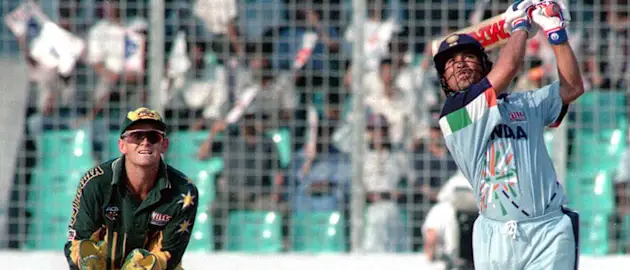10 best individual performances in the history of Champions Trophy


With the highly-awaited ICC Champions Trophy 2017 less than a fortnight away, the top eight teams in the MRF Tyres ICC ODI Team Rankings are all set to lock horns in England and Wales for the top prize. While cricket is a team sport based on collective drive, instances of one individual influencing the outcome of a match are numerous. Here’s a look back at five each of the best batting and bowling performances in the history of the competition.
TOP FIVE BATTING PERFORMANCES
Sachin Tendulkar, India v Australia, 28 October 1998, Dhaka
Australia, which 48 hours earlier had clinched a three-Test series against Pakistan 1-0, would have had no clue that its star-studded XI would be blown away by a one man in its first match of the inaugural ICC Champions Trophy, then known as the ICC KnockOut Trophy. The Steve Waugh-led side started off well by reducing India to 8 for 2 but then had no answer to Sachin Tendulkar's master class. The Indian opener struck a magnificent 141 off just 128 balls at the Bangabandhu National Stadium, blasting 13 fours and three sixes in route to his 19th One-Day International century. Tendulkar shared a couple of 100-plus partnerships, with Rahul Dravid (48) and Ajay Jadeja (71) respectively, to guide India to a massive total of 307 for 8. He then returned to weave a spin-web around the Australian batsmen with his mixture of off-breaks and leg-breaks, grabbing 4 for 38 to pack Australia off for 263 and give India a 44-run win.
Jacques Kallis, South Africa v Sri Lanka, 30 October 1998, Dhaka
In a match affected by rain, Jacques Kallis smoked as five sixes and as many boundaries to score a brilliant 113* off 107 deliveries in the semi-final against Sri Lanka. The all-rounder was the only batsman to score more than 30 from both sides combined, and single-handedly led South Africa to a total of 240 for 7 in 39 overs. Kallis, who was still carving a spot for himself in the South African line-up, mixed caution with aggression on a tricky surface and crafted a dominating inning against a strong bowling attack. In reply, Sri Lanka folded for just 132 runs, giving South Africa a 92-run win and a ticket to the final. South Africa went on to defeat West Indies in the final to be crowned the maiden champions – its only experience of winning a major ICC trophy.
Andy Flower, Zimbabwe v India, 14 September 2002, Colombo
Andy Flower constructed one of the greatest One-Day International hundreds in pursuit of India's formidable total of 288 for 6 at the R Premadasa Stadium, but when he eventually fell for a 164-ball 145 with 13 fours, his side went down by 14 runs in a thrilling contest. Rahul Dravid (71) and Mohammad Kaif (111 not out) had earlier rescued India from 87 for 5 and lifted it a challenging total. In reply, Andy found no support from the other end, except for handy contributions from brother Grant (33) and Guy Whittall (29). As a result, Zimbabwe could only manage to reach 274 for 8.
Shane Watson, Australia v England, 2 October 2009, Centurion
"The 2009 edition of the Champions Trophy in South Africa was the first time that I really felt like I belonged at the international level. These last two games in particular, really were the making of me as an international all-rounder," wrote Shane Watson recently in his ICC column.
After taking two wickets to help dismiss England for 257 in the semi-final in Centurion, Watson powered his way to 136 not out off 132 balls, including 10 fours and seven sixes, to take his side home with more than eight overs to spare. The explosive all-rounder added 242 runs for the second wicket with Ricky Ponting (111*) to make short work of England's total. He backed it up in the final with yet another century (105*) to destroy New Zealand and help Australia retain the title.
Shikhar Dhawan, India v South Africa, 6 June 2013, Cardiff
Shikhar Dhawan set the 2013 competition alight with his maiden One Day International century in the very first game of India's successful campaign against South Africa at Sophia Garden. The stylish left-handed stroke-maker carved a 94-ball 114 and added 127 for the first wicket with Rohit Sharma (65) to give India a tremendous start. Dhawan found the fence on 12 occasions and went over it once. With some help from Ravindra Jadeja's breezy 47 off 29 balls, India posted a mammoth total of 331. South Africa fought hard in reply but fell short by 26 runs. Dhawan carried his form throughout the tournament and ended up winning the golden bat for scoring the most number of runs in this edition - 363 in five matches. He was also named the player of the tournament for his significant role in India lifting the cup at Edgbaston, Birmingham.
TOP FIVE BOWLING PERFORMANCES
Shayne O'Connor, New Zealand v Pakistan, 11 October 2000, Nairobi
At 237 for 6 with 25 balls remaining, and a set Abdul Razzaq (48) and Wasim Akram (34) out in the middle, Pakistan looked all set to post a daunting total on a tricky pitch at the Gymkhana Club Ground. Shayne O'Connor, the left-arm fast-medium bowler, then ran through the lower order with four wickets in the space of nine deliveries to send Pakistan packing for 252. Having already accounted for Imran Nazir earlier in the game, O'Connor finished with the figures of 5 for 46, then the best haul of the tournament.
Aravinda de Silva, Sri Lanka v Australia, 27 September 2002, Colombo
In his only spell of 10 overs in the Champions Trophy, Aravinda de Silva ended his full quota of off-spin with the remarkable figures of 1 for 16 in the semi-final against Australia. Predominantly a batsman, de Silva was named the man of the match for his miserly spell, which put him in second position, behind only South African Dale Benkenstein (1.30), in the list of most economical bowlers in the history of the competition. Australia could only push to a total of 162 on a turning track. Sri Lanka had little trouble in hunting down the target, winning by seven wickets and then going on to share the trophy with India after rain interrupted the finals two days on the trot.
Farveez Maharoof, Sri Lanka v West Indies, 14 October 2006, Mumbai
Farveez Maharoof holds the best analysis in the history of the tournament - 9-2-14-6, achieved against West Indies at the Brabourne Stadium in a qualifying group match. Once Chaminda Vaas and Lasith Malinga reduced West Indies to 13 for 3, Maharoof produced the best spell of his career. There was no barrage of bouncers or toe-crushing yorkers. Instead, in the right-arm medium-pacer’s own words: "I kept it simple, with a touch of seam movement." West Indies lost its last seven batsmen for 29 runs and was bundled out for just 80 runs – the third lowest in the Champions Trophy. Sri Lanka then went on to chase the total down with 36.4 overs to spare.
Makhaya Ntini, South Africa v Pakistan, 27 October 2006, Mohali
Having only managed 213 runs on a greenish pitch with trampoline bounce at the Punjab Cricket Association Stadium, Makhaya Ntini unleashed a threatening opening spell to blast out five wickets for just eight runs in his first five overs and propel South Africa to a dominating 124-run win over Pakistan. Yasir Arafat (27), the No. 9, was the only batsman who managed to outscore Extras (16). The late Bob Woolmer went on to an extent of terming it "the worst batting I've seen by Pakistan in my time as coach." Before the game, Graeme Smith, the skipper, said his team was "feeling at home with the conditions" and Ntini with his hostile pace bowling indeed made Mohali look like Durban.
Lasith Malinga, Sri Lanka v New Zealand, 9 June 2013, Cardiff
Lasith Malinga delivered one of the most breathtaking spells of the 2013 edition but couldn't earn Sri Lanka victory over New Zealand in a low-scoring thriller. On a flat pitch with sun out and the ball not swinging, 'Slinga' Malinga collected 4 for 34 and made the 138-run chase terribly difficult for the Brendon McCullum-led side. From 48 for 1, New Zealand stumbled to 49 for 4 and then to 80 for 6. Nathan McCullum (32) and Tim Southee (13) batted with maturity once Malinga was off the attack and swung the pendulum in New Zealand's favour. Cruising at 115 for 6 with the McCullum brothers in the middle, Malinga returned to throw a final twist by dismissing both in the space of three deliveries. Mitchell McClenaghan, who played a key role in the first innings with figures of 4 for 43, hung around with Southee to give New Zealand its first win over Sri Lanka in four years.


